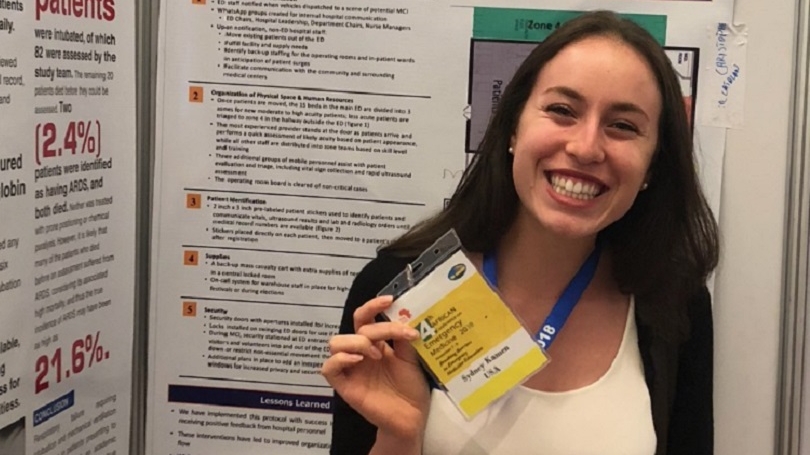
- Public Policy
- Leadership
- Funding
- News & Events
- About the Center
Back to Top Nav
Back to Top Nav
Back to Top Nav
Back to Top Nav
Mini-Grant recipient, Sydney Kamen '19, shares her experience attending the 4th African Conference on Emergency Medicine (AfCEM) in Kigali, Rwanda.
From November 7-9, 2018, I had the unique opportunity of attending the 4th African Conference on Emergency Medicine (AfCEM) in Kigali, Rwanda. This three-day conference convened leaders from across the African continent and globe to discuss, share, and collaborate on the theme: "Breaking Barriers in Emergency Medicine Education."
Attending AfCEM 2018 afforded me the opportunity to expand my sphere of knowledge, open my mind to new ideas and interventions, confronting cultural misconceptions in emergency medicine, and fill gaps in my baseline knowledge that are context-specific to the African continent and its diverse set of systems, expertise and geographic challenges, and build relationships with future mentors and colleagues.
I had the opportunity to engage with new research, programs, and interventions, as well as their authors and developers. In workshops, I also shared my experiences working in conflict and post-conflict zones to provide temporary and long-term supplies of hygiene and sanitation through my experiences working in East Africa with my nonprofit So Others Are Protected (SOAP).
As I learned from interacting with said colleagues, the education and training required to become a practitioner of global health and practice in the arena of emergency humanitarian assistance is a lifelong journey.
One session focused on medical and care-based apathy. A session where thirty practitioners, representing low-, middle-, and high-income countries on six continents, shared their best practices from the field. Other sessions addressed the health burdens of emergency diseases in Africa, methods for developing and implementing scalable emergency care systems, preventing and treating sepsis in low-resource environments, lessons learned from past and ongoing crises (post-earthquake Haiti, the Rohingya crisis, the war in Syria, etc.), and challenges in humanitarian assistance and disaster.
These sessions and their reciprocal panels introduced me to unique challenges and burdens experienced by communities throughout the African continent, in addition to unique innovations designed by local practitioners to address these limitations. For example, to address the absence of an emergency medical transport system in Ghana, a fascinating intervention is being implemented to educate cohorts of taxi drivers in basic first-aid and life-saving interventions to equip them to provide safer transportation of patients to hospitals.
I have come to believe that to be the most thoughtful and highly impactful practitioner one must not only engage with the literature but with the researchers and practitioners themselves.
I am grateful for the gracious support of the Rockefeller Center in supporting my education, development, and pursuit of a career in this field, operating on the African continent as a future practitioner of global health. As the Co-President of the International Development Forum at the Dickey Center, I plan to share the best practices I learn for health care in emergency situations in the context of the African continent with my organization, and co-host an event dedicated to health responses in the case of Ebola, which will be a focus of the conference.
-Submitted by Sydney Kamen '19, Rockefeller Center Mini-Grant Recipient
The Rockefeller Center's Mini-Grants program funds registration fees for students attending conferences, as well as the costs of bringing guest speakers to Dartmouth. The views and opinions expressed here are the author’s own and do not necessarily represent the views and opinions of the Rockefeller Center or constitute an endorsement by the Center.